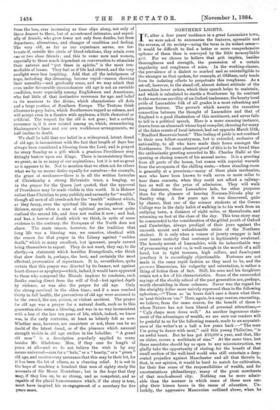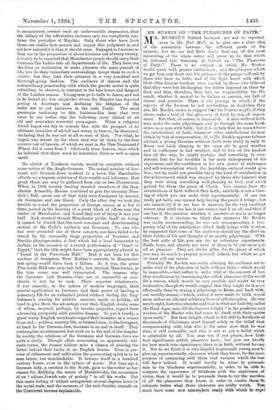NORTHERN LIGHTS.
IF, after a four years' residence in a great Lancashire town, we were asked. to summarise the features, agreeable and the reverse, of its society—using the term in its widest sense— it would be difficult to find a better or more comprehensive epitome of them than is conveyed by the little monosyllable grit. For we choose to believe that grit implies, besides thoroughness and strength, the possession of a certain angularity and roughness of mien. In the working-classes, the prevalence of a dialect so marked and so unintelligible to the stranger as that spoken, for example, at Oldham, only tends from its isolating effects to perpetuate this roughness. As a set-off, however, to the stand-off, almost defiant attitude of the Lancashire lower orders, which their speech helps to maintain, and which is calculated to startle a Southerner by its contrast to the unctuous servility of an Oxford tradesman, the hearty local pride of Lancashire folk of all grades is a most refreshing and genuine feature. The proverb which asserts the causative connection between the thought of Lancashire and that of England is a good illustration of this sentiment, and never fails to tell in a political speech. Here is a more amusing instance, drawn from an almanack whose loyal compiler, choosing for many of the dates events of local interest, had set opposite March 11th, " Bradford Reservoir burst." This feeling of pride is not confined to their own fellow-countrymen, but is extended, exclusive of nationality, to all who have made their home amongst the Northerners. No more pleasant proof of this is to be found than the enthusiastic greeting accorded to Mr. Charles Halle at the opening or closing concert of his annual series. It is a greeting from all parts of the house, but comes with especial warmth from the occupants of the shilling seats,—where standing-room is generally at a premium,—many of them plain mechanics, men who have been known to walk seven or more miles to hear these concerts, when they could not afford a railway- fare as well as the price of admission. They will walk long distances, these Lancashire lads, for other purposes than for the pleasure of hearing Norman-Neruda play or Santley sing. A few years ago it was discovered, quite by chance, that one of the science students at the Owens College was in the daily habit of walking in to his work from an outlying town, a distance of eight miles, or thereabouts, and returning on foot at the close of the day. This true story may be commended to the consideration of the gilded youth of Oxford and Cambridge, always prodigal of their jeers against the uncouth accent and unfashionable attire of the Northern student. It is only when a veneer of jaunty swagger is laid over innate rusticity that contempt is legitimately awakened. The homely accent of Lancashire, with its indescribable way of pronouncing as and us, is well enough in the mouth of a mill hand, but in tight trousers, high collars, and flamboyant jewellery it is exceedingly objectionable. Fortunes are not made in the same rapid fashion as they used to be, and the parvenu Mancunian, his vulgarity and ostentation, is rather a thing of fiction than of fact. Still, his sons and his daughters retain not a few of his characteristics. Some of the unrecorded sayings of the shoddy school of the past generation are, perhaps, worth chronicling in these columns. Never was the regard for the almighty dollar more naïvely expressed than in the following aphorism,—" Them as 'as brass don't care a damn what them as 'asnt thinks on 'ern." Here, again, is a sage maxim, emanating, we believe, from the same source, for the benefit of those to whom Nature has not been liberal of personal attractions,— "Ugly chaps mun dress well." As another ingenuous state- ment of the advantages of wealth, we are sure our readers will be grateful to us for the following remark, made to an acquaint- ance of the writer's at a ball a few years back :—" The man I'm going to dance with next," said this young Philistine, "is an awful beast. But he has got £10,000 a year, and that, like an ulster, covers a multitude of sins." At the same time, lest these anecdotes should lay us open to any misconstruction, we gladly take the opportunity of stating, for the benefit of that small section of the well-bred world who still entertain a deep- seated prejudice against Manchester and all that therein is, that, in our opinion, it would be hard to match for cultivation, for their fine sense of the responsibilities of wealth, and for unostentatious philanthropy, many of the great merchants of that much-abused city. Nothing can be more admir- able than the manner in which some of these men em- ploy their leisure hours in the cause of education. Un- luckily, the aggressive Mancunian outlined above, when he
is encountered, creates such an unfavourable impression, that the fallacy of the affirmative instance only too completely con- firms the prejudice of Mayfair. Only those who have lived there can realise how narrow and unjust this judgment is, and yet how natural it is that it should arise. Engaged in business as they are in the proportion of about nineteen out of every twenty, it is only to be expected that Manchester people should carry their business-like habits into all departments of life. They have not the time or inclination to make pleasure the main pursuit of life, nor do their immediate surroundings tempt them to such a coarse ; but they take their pleasure in a very practical and thorough-going fashion. The earliness of dances and the extraordinary punctuality with which the guests arrive is quite refreshing to observe, in contrast to the late hours and languor of the London season. Young men go to balls to dance, and not to be looked at ; the exquisite whom Du Manrier has depicted posing in doorways and declining the fatigues of the waltz are as yet unknown in the rude North. The most grotesque testimony to this business-like bent that ever came to our notice was the following story related of as old and somewhat eccentric yarn-agent. When a religions friend began one day to console him with the prospect of an ultimate cessation of all toil and worry in heaven, he demurred, declaring that he was not at all so sure of that. For what, he urged, was meant by the sheet that was let down by the four corners out of heaven, of which we read in the New Testament ? Where did it come from ? Obviously from heaven, from which he inferred that there must be industries there as well as upon earth.
No sketch of Northern society would be complete without some notice of the Anglo-German. The actual number of Ger- mans and German-Jews resident in a town .like Manchester affords no adequate criterion of their wealth and influence. How great these are may be gathered from one or two illustrations. When in 1882 twenty leading married members of the Man- chester Assembly Rooms combined to give the triennial Bene- dick's ball, seven out of that total were foreigners by descent, six Germans and one Greek. Only the other day we took the trouble to count the proportion of foreign names in a list of firms posted in the doorway of a great block of offices near the centre of Manchester, and found that out of thirty it was just half. And, musical though Manchester prides itself on being, it cannot be denied that the most constant and discriminating section of Mr. Halle's audience are Germans. No one who has ever attended one of these concerts can have failed to be struck by the unusually large proportion of Teutonic and Semitic physiognomies, a fact which led a local humourist to declare, on the occasion of a recent performance of " Israel in Egypt," that the title might have been appropriately altered to "Israel in the Free-trade Hall." Had it not been for this nucleus of foreigners Herr Richter's concerts in Manchester last spring would have been a failure. As it was, the great Free-trade Hall was only half full ; but musical Manchester, in the true sense, was well represented. The reasons why the Germans and German-Jews are so successful as mer- chants is not far to seek. Their superior attainments, if not capacity, in the sphere of modern languages, their greater application to business, and their power of leading a sedentary life for an unlimited period without feeling the Eng- lishman's craving for athletic exercise, sport, or holiday, all tend to give them the advantage over their English rivals, some of whom, inspired, perhaps, by insular prejudice, regard their advancing prosperity with positive dismay. To put it briefly, a great many English merchants regard their business as a means to an end,—politics, country life, or lettered ease; to the foreigner, at least to the German-Jew, business is an end in itself. They contemplate no retirement, but work on to the end of the chapter. In society the relations of the Germans and German-Jews are quite a study. Though often associating on apparently inti- mate terms, the former seldom miss a chance of abusing the latter behind their backs to an English hearer. Even in per- sons of refinement and cultivation the persecuting spirit is to be seen latent, but unmistakable. It betrays itself in a hundred curious forms, even in the sphere of music. Not long ago a German lady, a resident in the North, gave to the writer as her reason for disliking the music of Mendelssohn, the occurrence of an " odious Jewish vein of melody " in all his works. Put this same feeling of violent antagonism several degrees lower in the social scale, and the excesses of the anti-Semitic crusade on
the Continent become explainable.















































 Previous page
Previous page